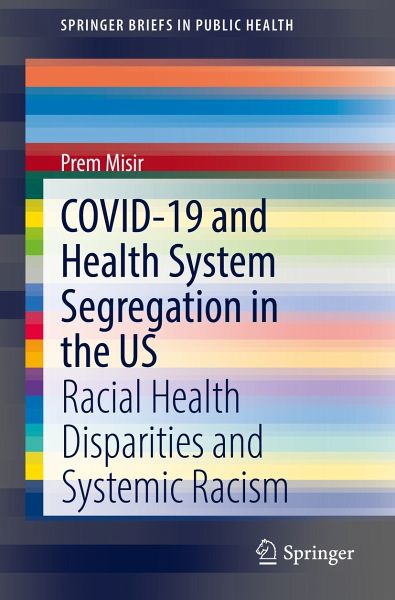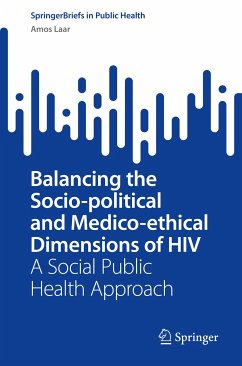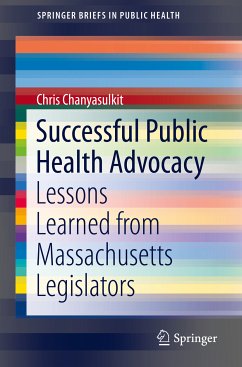
COVID-19 and Health System Segregation in the US (eBook, PDF)
Racial Health Disparities and Systemic Racism
Versandkostenfrei!
Sofort per Download lieferbar
48,95 €
inkl. MwSt.
Weitere Ausgaben:

PAYBACK Punkte
24 °P sammeln!
This book highlights and suggests remedies for the racial and ethnic health disparities confronting people of color amid COVID-19 in the United States. Racial and ethnic health disparities stem from social conditions, not from racial features, that are deeply grounded in systemic racism, operating through the White racial frame. Race and ethnicity are significant factors in any review of health inequity and health inequality. Hence, any realistic end to racial health disparities lies beyond the scope of the health system and health care. The book explores structuration theory, which examines t...
This book highlights and suggests remedies for the racial and ethnic health disparities confronting people of color amid COVID-19 in the United States. Racial and ethnic health disparities stem from social conditions, not from racial features, that are deeply grounded in systemic racism, operating through the White racial frame. Race and ethnicity are significant factors in any review of health inequity and health inequality. Hence, any realistic end to racial health disparities lies beyond the scope of the health system and health care. The book explores structuration theory, which examines the duality between agency and structure as a possibly potent pathway toward dismantling systemic racism, the White racial frame, and racialized social systems.
In particular, the author examines COVID-19 with a focus on the segregated health system of the US. The US health system operates on the doctrine of 'separate but equal', whereby the dominant group has access to quality health care and people of color have access to a lesser quality or zero health care. 'Separation' implies and enforces inferiority in health care. Through the evidence presented, the author demonstrates that racial and ethnic health disparities are even worse than COVID-19. As in the past, this contagion, like other viruses, will dissipate at some point, but the disparities will persist if the US legislative and economic engines do nothing. The author also raises consciousness to demand a national commission of inquiry on the disproportionate devastation wreaked on people of color in the US amid COVID-19. COVID-19 may be the signature event and an opportunity to trigger action to end racial and ethnic health disparities.
Topics covered within the chapters include:Introduction: Segregation of Health Care Systemic Racism and the White Racial Frame Dismantling Systemic Racism and Structuration Theory COVID-19 and Health System Segregation in the US is a timely resource that should engage the academic community, economic and legislative policy makers, health system leaders, clinicians, and public policy administrators in departments of health. It also is a text that can be utilized in graduate programs in Medical Education, Global Public Health, Public Policy, Epidemiology, Race and Ethnic Relations, and Social Work.
In particular, the author examines COVID-19 with a focus on the segregated health system of the US. The US health system operates on the doctrine of 'separate but equal', whereby the dominant group has access to quality health care and people of color have access to a lesser quality or zero health care. 'Separation' implies and enforces inferiority in health care. Through the evidence presented, the author demonstrates that racial and ethnic health disparities are even worse than COVID-19. As in the past, this contagion, like other viruses, will dissipate at some point, but the disparities will persist if the US legislative and economic engines do nothing. The author also raises consciousness to demand a national commission of inquiry on the disproportionate devastation wreaked on people of color in the US amid COVID-19. COVID-19 may be the signature event and an opportunity to trigger action to end racial and ethnic health disparities.
Topics covered within the chapters include:
Dieser Download kann aus rechtlichen Gründen nur mit Rechnungsadresse in A, B, BG, CY, CZ, D, DK, EW, E, FIN, F, GR, HR, H, IRL, I, LT, L, LR, M, NL, PL, P, R, S, SLO, SK ausgeliefert werden.
Alle Preise in Euro und inkl. der gesetzl. MwSt. | Innerhalb Deutschlands liefern wir preisgebundene Bücher versandkostenfrei. Weitere Informationen: bitte hier klicken
Support
Bitte wähle dein Anliegen aus:
Rechnungen
Bestellstatus
Retourenschein
Storno












